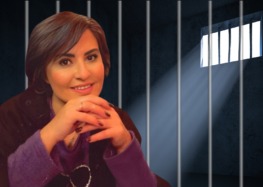Appendix 2
IRAN’S STATE PRISONS AND SECURITY AND CORRECTIVE MEASURES ORGANIZATION
Numerous articles pertaining to the treatment of prisoners in the Procedures of Iran’s State Prisons and Security and Corrective Measures Organization, which operates under the authority of Iran’s Judiciary, con rm the violations regularly committed against the prisoners of Evin’s Women’s Ward.
SLEEPING QUARTERS
• ARTICLE 71: Each inmate will be issued the following essentials for sleeping: a bed, a mattress, a pillow, two blankets, and bed linens for blanket, mattress and pillow.
NUTRITION
• ARTICLE 93: Prisoners are given three daily meals, breakfast, lunch, dinner, and foods that have sufficient calories and vitamins. According to approved menus, suitable for the climate in each location, tea and healthy drinking water will be made available to the prisoners. Relevant authorities must work sufficiently and continually to provide the necessary appliances to prevent food items from spoiling and to clean the dishes and the kitchen.
• ARTICLE 95: The minimum menu includes: Bread, cheese, and tea for breakfast, lunch or dinner, fresh or dried vegetables, rice, potatoes, onions, legumes, various dairy products, eggs, and seasonal fruits each week, [and] the convicts will be served meat with their lunch or dinner at least three times per week.
• ARTICLE 98: Inside institutions or prisons, as necessary…stores will be established and the Head of the Institution or Prison will be responsible for their oversight according to his responsibilities. Note 1: Choosing the permissible items and staples for sale inside the prison stores, with consideration for prison hygiene and safety, will be done by the Head of the Prison and their prices will be based on the fair going rate. Note 2: Items and staples inside the prison stores must not be priced higher than the fair going rate and if necessary, items offered in the coop must be sold at coop rates.
MEDICAL CARE
• ARTICLE 102: The institution or prison’s infirmary is obligated to conduct at least once-a-month medical tests on all convicts.
• ARTICLE 103: To the extent possible, measures should be taken to meet the sick convict’s medical treatment needs inside the prison, so that it would not be necessary to transfer the convicts outside of the prison. Nevertheless, when necessary, the convict’s transfer for treatment must be confirmed by the prison infirmary and permitted by the institution or prison head and with permission of the supervising judge. In emergencies, the sick convict will be transferred to a hospital with the prison infirmary’s or the physician’s orders and by permission of the head of the institute or prison or his deputy, and the situation must be reported in writing to the supervising judge as soon as possible.
• ARTICLE 111, The infirmary of the penal institution or prison must give complete medical check- ups to a new prisoner. If necessary, the prisoner must be given the required medical tests, and proper steps should be taken to either treat him or transfer him to [a better equipped] hospital; all medical actions must be noted down in the prisoner’s file.
• ARTICLE 112: Whenever a new prisoner carries a prescription or drug, it will be taken by the prison’s infirmary so the infirmary’s doctor can prescribe the prisoner’s needed dosage. If the prisoner’s life depends on the drug, it must be given to him immediately after the doctor examines and prescribes the drug for him.
• ARTICLE 113: The prisoner should inform the guard as soon as he feels ill. After acquiring a permit, the prisoner must be sent to the infirmary of the penal institution or prison in order to receive the needed drugs and medical instructions.
• ARTICLE 115: After diagnosing the prisoner’s illness, the doctor of the penal institution or prison decides whether the prisoner should be placed under medical care in the prison’s infirmary. The doctor’s written decision must be put in the patient’s file.
• ARTICLE 118: Examination, and when necessary treatment, of sick convicts is the responsibility of the prison or training facility.
• ARTICLE 120: The head of prison’s infirmary is required to visit all prisoners who are held under care in the infirmary every morning. After inquiry into the conditions of prisoners and making certain that they receive adequate care from doctors and nurses, he must supervise the patients’ proper diet and recovery completely and continually.
DISCIPLINARY ACTION:
• ARTICLE 169: Imprecations, utterance of indecent words, and ill temper toward the accused or prison- er violate the law. All physical, violent, agonizing and insulting punishments are entirely forbidden in penal institutions and prisons.
• ARTICLE 175: Permissible punishment includes suspension of a maximum of three visitation rights, denial of furlough for up to three months, denial of recommendation for conditional pardon or release for up to six months, and solitary confinement for no more than 20 days.
VISITATION:
• ARTICLE 69, NOTE 1: Female inmates can have their children next to them in prison until the age of 2, and Prison Heads and Wardens are authorized to make decisions about establishing day care centers in a separate space to hold children from 2 until 6 years of age, or to transfer the children to the Iranian Welfare Organization.
• ARTICLE 182: The spouse, father, mother, brother, sister, and children of a convict or suspect, as well as his/her spouse’s parents are entitled to have weekly visits with the convict based on circumstances, and other relatives and friends of the convict can also meet with him/her if granted permission by the head of the institution or prison facility or the supervising judge at the facility.
• ARTICLE 183: Convicts who have demonstrated good behavior can, upon approval by head of the institution or the facility’s supervising judge, have in-person visits with their spouse, children, father, mother, brother, and sister, as well as their spouse’s parents, while a prison guard is in attendance.
• ARTICLE 185: In certain cases, convicts or suspects can have private visits, without the presence of a supervisor, with their spouse and children.
• ARTICLE 188: Note 2: The public visitation schedule should be organized in a way that each in- mate has at least one visitation per week, not to last under 20 minutes.
• ARTICLE 190: Under guidance from a physician, the Head Warden can facilitate visitations with sick inmates who are hospitalized and unable to move.
FURLOUGH:
• ARTICLE 213: In order to help consolidate the foundations and family and social relationships of prisoners, to rehabilitate them socially and to prepare the foundation for their return to the society, as well as their active participation in correction, education, and culture and sports, training, and employment, prisoners are granted furlough within the framework of this section. Note: Granting furlough to prisoners is not considered a right and access to it is subject to the prisoner’s compliance with the prison rules and earning the required points.
• ARTICLE 221: Exceptions for Granting Furlough: Individuals convicted of the following crimes are excepted from receiving furlough: A: Armed robbery convicts; stealing property belonging to others through snatching purses; espionage; acting against national security; kidnapping; gang-related and organized crimes; rape; establishing corruption and prostitution centers; acid throwing; disrupting the country’s economic system; importing, manufacturing, distribution and sale of alcoholic beverages; armed or wholesale smuggling of narcotics and psychedelic drugs. B: Convicts with three previous instances of convictions of the same crime. C: Convicts known for thuggery. D. Qisas [retribution] Law convicts and individuals sentenced to death.
• ARTICLE 214: Covering Conditions for Receiving Furlough: Note 4: All convicts, except those included in Article 221, are allowed one instance of furlough leave without meeting the conditions reflected in this article in the case of marriage or death of one of their first degree relatives (father, mother, child, wife, brother, sister).
Source: Iran State Prisons and Security and Corrective Measures Organization (as translated by the International Campaign for Human Rights in Iran)
http://goo.gl/XttewP And: https://iranhumanrights.org/2011/08/kar_analysis_2/


